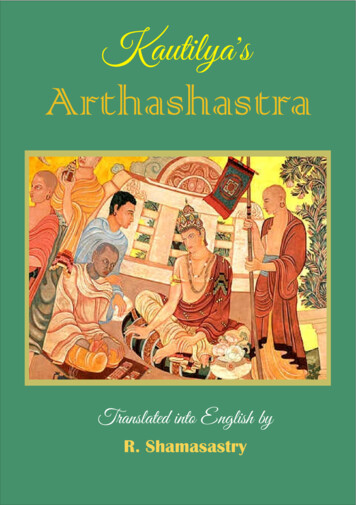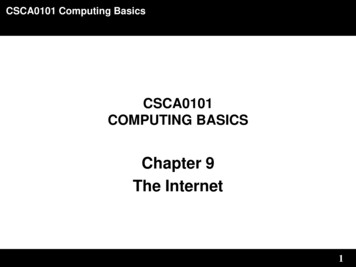
Transcription
Kautilya'sArthashastraTranslated into English byR. Shamasastry
Kautilya'sArthashastraTranslated into English byR. Shamasastry
Kautilya's ArthashastraTable of ContentsBook I, "Concerning Discipline" . 3Book II, "The Duties of Government Superintendents" . 60Book III, "Concerning Law" . 213Book IV, "The Removal of Thorns". 285Book V, "The Conduct of Courtiers" . 336Book VI: The Source of Sovereign States . 362Book VII, "The End of the Six-Fold Policy" . 370Book VIII: Concerning Vices and Calamities. 467Book IX, "The Work of an Invader" . 490Book X, "Relating to War" . 521Book XI, "The Conduct of Corporations" . 541Book XII, "Concerning a Powerful Enemy" . 547Book XIII, "Strategic Means to Capture a Fortress" . 563Book XIV, "Secret Means" . 584Book XV, "The Plan of a Treatise" . 6072
Kautilya's ArthashastraBook I, "Concerning Discipline"CHAPTER I. THE LIFE OF A KINGÓm.Salutation to Sukra and Brihaspati.This Arthasástra is made as a compendium of almost all theArthasástras, which, in view of acquisition and maintenance of theearth, have been composed by ancient teachers.Of this work, the following are the contents by sections andbooks:BOOK I. Concerning Discipline.The end of Sciences; association with the aged; restraint ofthe organs of sense; the creation of ministers; the creation ofcouncillors and priests; ascertaining by temptations purity orimpurity in the character of ministers; the institution of spies.Protection of parties for or against one's own cause in one's ownstate; winning over the factions for or against an enemy's cause inan enemy's state; the business of council meeting; the mission ofenvoys; protection of princes; the conduct of a prince kept underrestraint; treatment of a prince kept under restraint; the duties of aking; duty towards the harem; personal safety.BOOK II. The Duties of Government Superintendents.3
Kautilya's ArthashastraFormation of villages; division of land; construction of forts;buildings within the fort; the duty of the chamberlain; the businessof collection of revenue by the collector-general; the business ofkeeping up accounts in the office of accountants; detection of whatis embezzled by government servants out of state-revenue;examination of the conduct of Government servants; the procedureof forming royal writs; the superintendent of the treasury;examination of gems that are to be entered into the treasury;conducting mining operations and manufacture; the superintendentof gold; the duties of the state goldsmith in the high road; thesuperintendent of store-house; the superintendent of commerce;the superintendent of forest produce; the superintendent of thearmoury; the superintendent of weights and measures;measurement of space and time; the superintendent of tolls; thesuperintendent of weaving; the superintendent of agriculture; thesuperintendent of liquor; the superintendent of slaughter-house; thesuperintendent of prostitutes; the superintendent of ships; thesuperintendent of cows; the superintendent of horses; thesuperintendent of elephants; the superintendent of chariots; thesuperintendent of infantry; the duty of the commander-in-chief ,the superintendent of passports; the superintendent of pasturelands; the duty of revenue collectors; spies in the guise ofhouseholders, merchants, and ascetics; the duty of a citysuperintendent.BOOK III. Concerning Law.Determination of forms of agreements; determination of legaldisputes; concerning marriage; division of inheritance; buildings;non-performance of agreements; recovery of debts; concerningdeposits; rules regarding slaves and labourers; co-operativeundertakings; rescision of purchase and sale; resumption of gifts,4
Kautilya's Arthashastraand sale without ownership; ownership; robbery; defamation;assault; gambling and betting, and miscellaneous.BOOK IV. Removal of Thorns.Protection of artisans; protection of merchants; remediesagainst national calamities; suppression of the wicked living byfoul means; detection of youths of criminal tendency by asceticspies; seizure of criminals on suspicion or in the very act;examination of sudden death; trial and torture to elicit confession;protection of all kinds of government departments; fines in lieu ofmutilation of limbs; death with or without torture; sexualintercourse with immature girls; atonement for violating justice.BOOK V. Conduct of Courtiers.Concerning the awards of punishments; replenishment of thetreasury; concerning subsistence to government servants; theconduct of a courtier; time-serving; consolidation of the kingdomand absolute sovereignty.BOOK VI. The Source of Sovereign States.The elements of sovereignty; concerning peace and exertion.BOOK VII. The End of Sixfold Policy.The sixfold policy; determination of deterioration, stagnation,and progress; the nature of alliance; the character of equal, inferiorand superior kings; forms of agreement made by an inferior king;neutrality after proclaiming war or after concluding a treaty of5
Kautilya's Arthashastrapeace; marching after proclaiming war or after making peace; themarch of combined powers; considerations about marching againstan assailable enemy and a strong enemy; causes leading to thedwindling, greed and disloyalty of the army; considerations aboutthe combination of powers; the march of combined powers;agreement of peace with or without definite terms; and peace withrenegades; peace and war by adopting the double policy; theattitude of an assailable enemy; friends that deserve help;agreement for the acquisition of a friend or gold; agreement ofpeace for the acquisition of land; agreement for undertaking awork; considerations about an enemy in the rear; recruitment oflost power; measures conducive to peace with a strong andprovoked enemy; the attitude of a conquered enemy; the attitude ofa conquered king; making peace and breaking it; the conduct of aMadhyama king; of a neutral king and of a circle of states.BOOK VIII. Concerning Vices and Calamities.The aggregate of the calamities of the elements ofsovereignty; considerations about the troubles of the king and hiskingdom; the aggregate of the troubles of men; the group ofmolestations; the group of obstructions; and the group of financialtroubles; the group of troubles of the army; and the group oftroubles of a friend.BOOK IX. The Work of an Invader.The knowledge of power, place, time, strength and weakness;the time of invasion; the time for recruiting the army; the form ofequipment; the work of arraying a rival force; considerations ofannoyance in the rear; remedies against internal and externaltroubles; consideration about loss of men, wealth and profit.6
Kautilya's ArthashastraInternal and external dangers; persons associated with traitors andenemies; doubts about wealth and harm; and success to be obtainedby the employment of alternative strategic means.BOOK X. Relating to War.Encampment; march of the camp; protection of the army intimes of distress and attack; forms of treacherous fights;encouragement to one's own army; the fight between one's ownand enemy's armies; battle-fields; the work of infantry, cavalry,chariots and elephants; distinctive array of troops in respect ofwings, flanks and front; distinction between strong and weaktroops; battles with infantry, cavalry, chariots and elephants; thearray of the army like a staff, a snake, a circle or in detached order;the array of the army against that of an enemy.BOOK XI. The Conduct of Corporations.Causes of dissension; secret punishment.BOOK XII. Concerning a Powerful Enemy.The duties of a messenger; battle of intrigue; slaying thecommander-in-chief, and inciting a circle of states; spies withweapons, fire, and poison; destruction of supply of stores, and ofgranaries; capture of the enemy by means of secret contrivances orby means of the army; and complete victory.BOOK XIII. Strategic Means to Capture a Fortress.Sowing the seeds of dissension; enticement of kings by secretcontrivances; the work of spies in a siege; the operation of a siege;7
Kautilya's Arthashastrarestoration of peace in a conquered country.BOOK XIV. Secret Means.Means to injure an enemy; wonderful and delusivecontrivances; remedies against the injuries of one's own army.BOOK XV. The Plan of a Treatise.Paragraphical divisions of this treatise.Such are the contents of this Science. There are on the whole15 books, 150 chapters, 180 sections and 6,000 slokas.This Sástra, bereft of undue enlargement and easy to graspand understand, has been composed by Kautilya in words themeaning of which has been definitely settled.[Thus ends Chapter I, "Life of a King" in Book I, "ConcerningDiscipline" of the Arthasástra of Kautilya.]CHAPTER II. THE END OF SCIENCES.Determination of the place of Anvikshaki.ANVIKSHAKI, the triple Védas (Trayi), Várta (agriculture,cattle-breeding and trade), and Danda-Niti (science ofgovernment) are what are called the four sciences.The school of Manu (Manava) hold that there are only threesciences: the triple Vedas, Varta and the science of government,8
Kautilya's Arthashastrainasmuch as the science of Anvikshaki is nothing but a specialbranch of the Vedas.The school of Brihaspati say that there are only two sciences:Varta and the science of government, inasmuch as the TripleVedas are merely an abridgment (Samvarana, pretext?) for a manexperienced in affairs temporal (Lokayatravidah).The school of Usanas declare that there is only one science,and that the science of government; for, they say, it is in thatscience that all other sciences have their origin and end.But Kautilya holds that four and only four are the sciences;wherefore it is from these sciences that all that concernsrighteousness and wealth is learnt, therefore they are so called.Anvikshaki comprises the Philosophy of Sankhya, Yoga, andLokayata (Atheism ?).Righteous and unrighteous acts (Dharmadharmau) are learntfrom the triple Vedas; wealth and non-wealth from Varta; theexpedient and the inexpedient (Nayanayau), as well as potency andimpotency (Balabale) from the science of government.When seen in the light of these sciences, the science ofAnvikshaki is most beneficial to the world, keeps the mind steadyand firm in weal and woe alike, and bestows excellence offoresight, speech and action.Light to all kinds of knowledge, easy means to accomplish allkinds of acts and receptacle of all kinds of virtues, is the Science ofAnvikshaki ever held to be.[Thus ends Chapter II, "Determination of the place of Anvikshaki"among Sciences in Book I, "Concerning Discipline" of the9
Kautilya's ArthashastraArthasástra of Kautilya.]CHAPTER III. THE END OF SCIENCES.Determination of the place of the Triple Vedas.THE three Vedas, Sama, Rik and Yajus, constitute the tripleVedas. These together with Atharvaveda and the Itihasaveda are(known as) the Vedas.Siksha (Phonetics), Kalpa (ceremonial injunctions),Vyakarana (grammar), Nirukta (glossarial explanation of obscureVedic terms), Chandas (Prosody), and Astronomy form the Angas.As the triple Vedas definitely determine the respective dutiesof the four castes and of the four orders of religious life, they arethe most useful.The duty of the Brahman is study, teaching, performance ofsacrifice, officiating in others' sacrificial performance and thegiving and receiving of gifts.That of a Kshatriya is study, performance of sacrifice, givinggifts, military occupation, and protection of life.That of a Vaisya is study, performance of sacrifice, givinggifts, agriculture, cattle breeding, and trade.That of a Sudra is the serving of twice-born (dvijati),agriculture, cattle-breeding, and trade (varta), the profession ofartizans and court-bards (karukusilavakarma).10
Kautilya's ArthashastraThe duty of a householder is earning livelihood by his ownprofession, marriage among his equals of different ancestral Rishis,intercourse with his wedded wife after her monthly ablution, giftsto gods, ancestors, guests, and servants, and the eating of theremainder.That of a student (Brahmacharin) is learning the Vedas,fire-worship, ablution, living by begging, and devotion to histeacher even at the cost of his own life, or in the absence of histeacher, to the teacher's son, or to an elder classmate.That of a Vanaprastha (forest-recluse) is observance ofchastity, sleeping on the bare ground, keeping twisted locks,wearing deer-skin, fire-worship, ablution, worship of gods,ancestors, and guests, and living upon food stuffs procurable inforests.That of an ascetic retired from the world (Parivrajaka) iscomplete control of the organs of sense, abstaining from all kindsof work, disowning money, keeping from society, begging in manyplaces, dwelling in forests, and purity both internal and external.Harmlessness, truthfulness, purity, freedom from spite,abstinence from cruelty, and forgiveness are duties common to all.The observance of one's own duty leads one to Svarga andinfinite bliss (Anantya). When it is violated, the world will come toan end owing to confusion of castes and duties.Hence the king shall never allow people to swerve from theirduties; for whoever upholds his own duty, ever adhering to thecustoms of the Aryas, and following the rules of caste and divisionsof religious life, will surely. be happy both here and hereafter. Forthe world, when maintained in accordance with injunctions of thetriple Vedas, will surely progress, but never perish.11
Kautilya's Arthashastra[Thus ends Chapter III, "Determination of the place of the TripleVedas" among Sciences in Book I, "Concerning Discipline" of theArthasástra of Kautilya.]CHAPTER IV. THE END OF SCIENCES.Varta and Dandaniti.AGRICULTURE, cattle-breeding and trade constitute Varta.It is most useful in that it brings in grains, cattle, gold, forestproduce (kupya), and free labour (vishti). It is by means of thetreasury and the army obtained solely through Varta that the kingcan hold under his control both his and his enemy's party.That sceptre on which the well-being and progress of thesciences of Anvikshaki, the triple Vedas, and Varta depend isknown as Danda (punishment). That which treats of Danda is thelaw of punishment or science of government (dandaniti).It is a means to make acquisitions, to keep them secure, toimprove them, and to distribute among the deserved the profits of.improvement. It is on this science of government that the course ofthe progress of the world depends."Hence," says my teacher, "whoever is desirous of theprogress of the world shall ever hold the sceptre raised(udyatadanda). Never can there be a better instrument than thesceptre to bring people under control.""No," says Kautilya; for whoever imposes severe punishmentbecomes repulsive to the people; while he who awards mildpunishment becomes contemptible. But whoever imposes12
Kautilya's Arthashastrapunishment as deserved becomes respectable. For punishment(danda) when awarded with due consideration, makes the peopledevoted to righteousness and to works productive of wealth andenjoyment; while punishment, when ill-awarded under theinfluence of greed and anger or owing to ignorance, excites furyeven among hermits and ascetics dwelling in forests, not to speakof householders.But when the law of punishment is kept in abeyance, it givesrise to such disorder as is implied in the proverb of fishes(matsyanyayamudbhavayati); for in the absence of a magistrate(dandadharabhave), the strong will swallow the weak; but underhis protection, the weak resist the strong.This people (loka) consisting of four castes and four orders ofreligious life, when governed by the king with his sceptre, willkeep to their respective paths, ever devotedly adhering to theirrespective duties and occupations.[Thus ends Chapter IV, "Determination of the Place of Varta and ofDandaniti" among Sciences in Book I, "Concerning Discipline" ofthe Arthasástra of Kautilya. "The End of Sciences" is completed.]CHAPTER V. ASSOCIATION WITH THE AGED.HENCE the (first) three sciences (out of the four) aredependent for their well-being on the science of government.Danda, punishment, which alone can procure safety and security oflife is, in its turn, dependent on discipline (vinaya).Discipline is of two kinds: artificial and natural; for13
Kautilya's Arthashastrainstruction (kriya) can render only a docile being conformable tothe rules of discipline, and not an undocile being (adravyam). Thestudy of sciences can tame only those who are possessed of suchmental faculties as obedience, hearing, grasping, retentivememory, discrimination, inference, and deliberation, but not othersdevoid of such faculties.Sciences shall be studied and their precepts strictly observedunder the authority of specialist teachers.Having undergone the ceremony of tonsure, the student shalllearn the alphabet (lipi) and arithmetic. After investiture withsacred thread, he shall study the triple Vedas, the science ofAnvikshaki under teachers of acknowledged authority (sishta), thescience of Vatra under government superintendents, and thescience of Dandaniti under theoretical and practical politicians(vaktriprayoktribhyah).He (the prince) shall observe celibacy till he becomes sixteenyears old. Then he shall observe the ceremony of tonsure (godana)and marry.In view of maintaining efficient discipline, he shall ever andinvariably keep company with aged professors of sciences inwhom alone discipline has its firm root.He shall spend the forenoon in receiving lessons in militaryarts concerning elephants, horses, chariots, and weapons, and theafternoon in hearing the Itihasa.Purana, Itivritta (history), Akhyayika (tales), Udaharana(illustrative stories), Dharmasastra, and Arthasastra are (knownby the name) Itihasa.14
Kautilya's ArthashastraDuring the rest of the day and night, he shall not only receivenew lessons and revise old lessons, but also hear over and againwhat has not been clearly understood.For from hearing (sutra) ensues knowledge; from knowledgesteady application (yoga) is possible; and from applicationself-possession (atmavatta) is possible. This is what is meant byefficiency of learning (vidhyasamarthyam).The king who is well educated and disciplined in sciences,devoted to good Government of his subjects, and bent on doinggood to all people will enjoy the earth unopposed.[Thus ends Chapter V, "Association with the Aged" in Book I,"Concerning Discipline" of the Arthasástra of Kautilya.]CHAPTER VI. RESTRAINT OF THE ORGANS OF SENSE.The Shaking off of the Aggregate of the Six Enemies.RESTRAINT of the organs of sense, on which success instudy and discipline depends can be enforced by abandoning lust,anger, greed, vanity (mána), haughtiness (mada), and overjoy(harsha).Absence of discrepancy (avipratipatti) in the perception ofsound, touch, colour, flavour, and scent by means of the ear, theskin, the eyes, the tongue, and the nose, is what is meant by therestraint of the organs of sense. Strict observance of the precepts ofsciences also means the same; for the sole aim of all the sciences isnothing but restraint of the organs of sense.Whosoever is of reverse character, whoever has not his15
Kautilya's Arthashastraorgans of sense under his control, will soon perish, thoughpossessed of the whole earth bounded by the four quarters.For example: Bhoja, known also by the name, Dándakya,making a lascivious attempt on a Bráhman maiden, perished alongwith his kingdom and relations;So also Karála, the Vaideha. Likewise Janamejaya under theinfluence of anger against Bráhmans, as well as Tálajanghaagainst the family of Bhrigus.Aila in his attempt under the influence of greed to makeexactions from Bráhmans, as well as Ajabindu, the Sauvíra (in asimilar attempt);Rávana unwilling under the influence of vanity to restore astranger's wife, as well as Duryodhana to part with a portion of hiskingdom; Dambhodbhava as well as Arjuna of Haihaya dynastybeing so haughty as to despise all people;Vátápi in his attempt under the influence of overjoy to attackAgastya, as well as the corporation of the Vrishnis in their attemptagainst Dvaipáyana.Thus these and other several kings, falling a prey to theaggregate of the six enemies and having failed to restrain theirorgans of sense, perished together with their kingdom andrelations. Having driven out the aggregate of the six enemies, aswell as Ambarísha of Jámadagnya famous for his restraint of theorgans of sense Nábhága long enjoyed the earth.[Thus ends Chapter VI, "The Shaking off of the Aggregate of theSix Enemies" in the section of the "Restraint Of the Organs ofSense" in Book I, "Concerning Discipline" of the Arthasástra ofKautilya.]16
Kautilya's ArthashastraCHAPTER VII. RESTRAINT OF THE ORGANS OF SENSE.The Life of a Saintly King.HENCE by overthrowing the aggregate of the six enemies, heshall restrain the organs of sense; acquire wisdom by keepingcompany with the aged; see through his spies; establish safety andsecurity by being ever active; maintain his subjects in theobservance of their respective duties by exercising authority; keepup his personal discipline by receiving lessons in the sciences; andendear himself to the people by bringing them in contact withwealth and doing good to them.Thus with his organs of sense under his control, he shall keepaway from hurting the women and property of others; avoid notonly lustfulness, even in dream, but also falsehood, haughtiness,and evil proclivities; and keep away from unrighteous anduneconomical transactions.Not violating righteousness and economy, he shall enjoy hisdesires. He shall never be devoid of happiness. He may enjoy in anequal degree the three pursuits of life, charity, wealth, and desire,which are inter-dependent upon each other. Any one of these three,when enjoyed to an excess, hurts not only the other two, but alsoitself.Kautilya holds that wealth and wealth alone is important,inasmuch as charity and desire depend upon wealth for theirrealisation.Those teachers and ministers who keep him from falling aprey to dangers, and who, by striking the hours of the day asdetermined by measuring shadows (chháyánálikápratodena) warn17
Kautilya's Arthashastrahim of his careless proceedings even in secret shall invariably berespected.Sovereignty (rájatva) is possible only with assistance. Asingle wheel can never move. Hence he shall employ ministers andhear their opinion.[Thus ends Chapter VII, “The Life of a Saintly King” in the sectionof the “Restraint of the Organs of Sense,” in Book I, “ConcerningDiscipline” of the Arthasástra of Kautilya; “Restraint of theOrgans of Sense" is completed.]CHAPTER VIII. CREATION OF MINISTERS."THE King," says Bháradvája, "shall employ his classmatesas his ministers; for they can be trusted by him inasmuch as he haspersonal knowledge of their honesty and capacity."“No,” says Visáláksha, "for, as they have been his playmatesas well, they would despise him. But he shall employ as ministersthose whose secrets, possessed of in common, are well known tohim. Possessed of habits and defects in common. with the king,they would never hurt him lest he would betray their secrets."“Common is this fear,” says Parásara, “for under the fear ofbetrayal of his own secrets, the king may also follow them in theirgood and bad acts."Under the control of as many persons as are made aware bythe king of his own secrets, might he place himself in all humilityby that disclosure. Hence he shall employ as ministers those whohave proved faithful to him under difficulties fatal to life and are oftried devotion."18
Kautilya's Arthashastra"No,” says Pisuna, “for this is devotion, but not intelligence(buddhigunah). He shall appoint as ministers those who, whenemployed as financial matters, show as much as, or more than, thefixed revenue, and are thus of tried ability.”"No," says Kaunapadanta, "for such persons are devoid ofother ministerial qualifications; he shall, therefore, employ asministers those whose fathers and grandfathers had been ministersbefore; such persons, in virtue of their knowledge of past eventsand of an established relationship with the king, will, thoughoffended, never desert him; for such faithfulness is seen evenamong dumb animals; cows, for example, stand aside from strangecows and ever keep company with accustomed herds.""No," says Vátavyádhi, "for such persons, having acquiredcomplete dominion over the king, begin to play themselves as theking. Hence he shall employ as ministers such new persons as areproficient in the science of polity. It is such new persons who willregard the king as the real sceptre-bearer (dandadhara) and darenot offend him.""No," says the son of Báhudantí (a woman); "for a manpossessed of only theoretical knowledge and having no experienceof practical politics is likely to commit serious blunders whenengaged in actual works. Hence he shall employ as ministers suchas are born of high family and possessed of wisdom, purity ofpurpose, bravery and loyal feelings inasmuch as ministerialappointments shall purely depend on qualifications.""This," says Kautilya, "is satisfactory in all respects; for aman's ability is inferred from his capacity shown in work. And inaccordance in difference in the working capacity,Having divided the spheres of their powers and having19
Kautilya's Arthashastradefinitely taken into consideration the place and time where andwhen they have to work, such persons shall be employed not ascouncillors (mantrinah) but as ministerial officers (amátyah).[Thus ends Chapter VIII, “Creation of Ministers” in Book I,“Concerning Discipline” of the Arthasástra of Kautilya.]CHAPTER IX. THE CREATION OF COUNCILLORS ANDPRIESTS.NATIVE, born of high family, influential, well trained in arts,possessed of foresight, wise, of strong memory, bold, eloquent,skillful, intelligent, possessed of enthusiasm, dignity, andendurance, pure in character, affable, firm in loyal devotion,endowed with excellent conduct, strength, health and bravery, freefrom procrastination and ficklemindedness, affectionate, and freefrom such qualities as excite hatred and enmity--these are thequalifications of a ministerial officer (amátyasampat).Such as are possessed of one-half or one-quarter of the abovequalifications come under middle and low ranks.Of these qualifications, native birth and influential positionshall be ascertained from reliable persons; educationalqualifications (silpa) from professors of equal learning; theoreticaland practical knowledge, foresight, retentive memory, andaffability shall be tested from successful, application in works;eloquence, skillfulness and flashing intelligence from powershown in narrating stories (katháyogeshu, i.e., in conversation);endurance, enthusiasm, and bravery in troubles; purity of life,friendly disposition, and loyal devotion by frequent association;20
Kautilya's Arthashastraconduct, strength, health, dignity, and freedom from indolence andficklemindedness shall be ascertained from their intimate friends;and affectionate and philanthrophic nature by personal experience.The works of a king may be visible, invisible (paroksha) andinferential.That which he sees is visible; and that which he is taught byanother is invisible; and inference of the nature of what is notaccomplished from what is accomplished is inferential.As works do not happen to be simultaneous, are various inform, and pertain to distant and different localities, the king shall,in view of being abreast of time and place, depute his ministers tocarry them out. Such is the work of ministers.Him whose family and character are highly spoken of, who iswell educated in the Vedás and the six Angas, is skillful in readingportents providential or accidental, is well versed in the science ofgovernment, and who is obedient and who can prevent calamitiesprovidential or human by performing such expiatory rites as areprescribed in the Atharvaveda, the king shall employ as high priest.As a student his teacher, a son his father, and a servant his master,the king shall follow him.That Kshatriya breed which is brought up by Bráhmans, ischarmed with the counsels of good councillors, and whichfaithfully follows the precepts of the sástras becomes invincibleand attains success though unaided with weapons.[Thus ends Chapter IX, “Creation of Councillors and Priests” inBook I “Concerning Discipline” of the Arthasástra of Kautilya.]21
Kautilya's ArthashastraCHAPTER X. ASCERTAINING BY TEMPTATIONSPURITY OR IMPURITY IN THE CHARACTER OFMINISTERS.ASSISTED by his prime minister (mantri) and his high priest,the king shall, by offering temptations, examine the character ofministers (amátya) appointed in government departments ofordinary nature.The king shall dismiss a priest who, when ordered, refuses toteach the Vedás to an outcaste person or to officiate in a sacrificialperformance (apparently) undertaken by an outcaste person(ayájya).Then the dismissed priest shall, through the medium of spiesunder the guise of class-mates (satri), instigate each minister oneafter another, saying on oath "this king is unrighteous; well let usset up in his place another king who is righteous, or who is born ofthe same family as of this king, or who is kept imprisoned, or aneighbouring king of his family and of self-sufficiency(ekapragraha), or a wild chief (atavika), o
15 books, 150 chapters, 180 sections and 6,000 slokas. This Sástra, bereft of undue enlargement and easy to grasp and understand, has been composed by Kautilya in words the meaning of which has been definitely settled. [Thus ends Chapter I, "Life of a King" in Book I, "Concerning Discipline" of the Arthasástra of Kautilya.] CHAPTER II.










